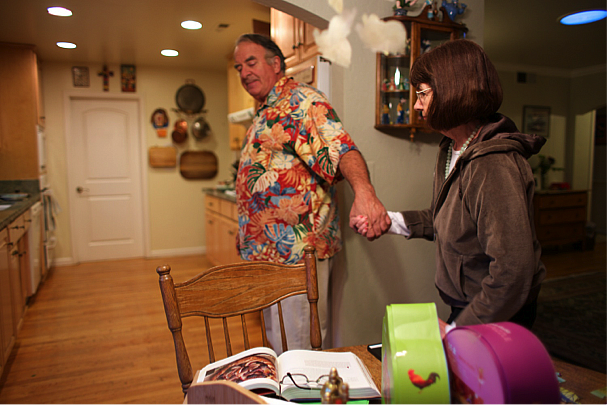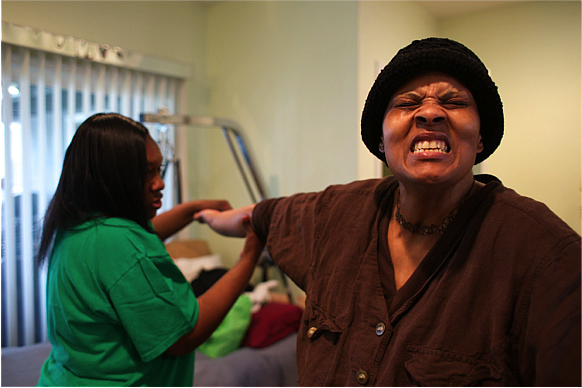For reporters covering stressful assignments, self-care is crucial

Rick Rayburn encourages his wife Marianne to help him make soup for supper. Capital Public Radio | Andrew Nixon
It was just a few weeks into the field-reporting phase of Capital Public Radio’s documentary on family caregivers. Our photographer Andrew Nixon revealed to me that he’d sat in his car and cried after a photo session with a man caring for his wife with dementia. Andrew told me the couple is about the same age as his parents and they live in the neighborhood where he grew up. The idea that this might happen to his family hit him hard.
A few days later, Katie Orr, who was reporting on a couple in their 50s caring for their severely disabled teenage son, mentioned that it was time to schedule the next recording session. She exhaled a very big sigh and admitted she was putting off calling them and didn’t know why.
As it turns out, the tears, exhaustion and procrastination are signs and symptoms of “vicarious stress,” or “compassion fatigue,” a condition sometimes experienced by reporters who cover stories of people who are living in very stressful situations. I was surprised to witness this in my team members so early in our four-month reporting project. It became a good opportunity to help us all develop healthier habits of on-the-job self-care.
With a thumbs up from the station’s News and Information Director Joe Barr and support from Community Engagement Specialist jesikah maria ross, I scheduled a training with Thom Sterling, who directs behavioral health services at a local community health center. He led us through a 90-minute session in which we shared emotionally challenging reporting experiences and discussed self-care strategies for coping with compassion fatigue.
(All quotes in this article are taken from video Reporter’s Notebook sessions. Our training session was not recorded for privacy reasons.)
Capital Public Radio reporter Katie Orr recalled meeting James and Judy Lee for the first time. “I got home and I was just feeling kind of weighed down. I just had to go for a run to get it all out of there. What I took away from it was, ‘Oh yeah, some of this does transfer over to me’.”
James Lee bathes his 16-year-old son Justin every evening. Capital Public Radio | Andrew Nixon
“I was dreaming about it,” said contributing reporter Julia Mitric. She was reporting on Rick Rayburn, a retiree caring for his wife, Marianne, who was diagnosed with younger-onset dementia. “I was waking up in the middle of the night thinking about it,” Mitric said. “I was boring my family to tears about it every day for months. You have to be careful that you don’t overdo it by becoming too consumed by the story.”
Contributing reporter Cosmo Garvin’s assignment was to spend several months with Loretta Jackson, a woman providing home care for her sister, who had a stroke, and her father, who has dementia.
“Honestly, it’s not great to think about some of these things happening in your own life,” Garvin said. “At the beginning of the project I thought, ‘This could be depressing.’ And Loretta is not about that, at all. She was pretty positive and upbeat, even though there’s some pretty serious stuff going on.”
Garvin had prepared himself for a potentially stressful assignment. He noticed that doing a good reporting job didn’t always make him feel good:
Loretta Jackson provides daily physical therapy for her sister, Shirlene English, who had a stroke. Capital Public Radio | Andrew Nixon
“But I knew that I had to try to get her to be real about the toll that the stress of being a caregiver can take, and some of the uncertainty and some of the anxiety that goes with it. And that didn’t feel very good to me because I don’t think she really wanted to go there. But I felt we had to get at that and be honest about it.”
Sterling, the clinical social worker, offered a range of coping strategies to alleviate on-the-job stress.
Prevent isolation:
- Find someone to talk to so you don’t feel alone.
- Keep a journal of emotions, thoughts and experiences.
- Understand the emotions you feel are normal.
Practice self-care:
- Exercise and eat properly.
- Relax regularly.
- Get enough sleep.
- Take some time off.
- Avoid mood-altering drugs and alcohol.
Practice mindfulness:
- Make time for simple activities that you enjoy: go for a walk, listen to music, spend time with a pet, read a book.
- Stay in the present by paying close attention to what is actually happening right now.
- Learn a mindfulness technique such as meditation, tai chi or yoga. Or simply focus on your breath for a few minutes as you inhale and exhale.
Julia Mitric developed a helpful mindset during her four months of reporting on the physical and mental health problems of Rick Rayburn and his wife:
“There were days where I had to steel myself a little bit before heading over to their house. I’d sit in my car and I’d just take a deep breath and I’d tell myself, ‘You’re gonna ask him some really difficult questions today about what it’s like to lose his best friend, his wife, and you have to keep it together. You just have to go in there and listen and not get too involved.’ And that really stretched me as a reporter and I look forward to working on other stories where there is that kind of emotional involvement. And I know now to be prepared.”
When reporters work on “The View From Here,” their reporting assignments are simple: spend a couple months with the people in your story, document aspects of their daily lives and say what you see. But that’s not an easy task because we are human beings. We feel it when others suffer. Discounting or denying symptoms of stress can cause personal and professional harm.
Reporters who cover stories about family caregivers, and other people coping with change and challenge often witness isolation, chronic illness, depression, disability, loss and pain. We are trained to look and listen deeply, not to turn away. How we cope with what we see and hear makes all the difference. To be better reporters, to be more present to what’s really going on in our communities, we must be prepared with strategies of self-care.
WARNING SIGNS AND SYMPTOMS
Physical: Exhaustion, insomnia, headaches, getting sick more often
Behavioral: Increased use of alcohol and drugs, missing work, irritability, social isolation, impaired ability to make decisions, problems in personal relationships
Psychological: Emotional exhaustion, cyncism, reduced ability to feel sympathy and empathy, distancing oneself from friends, family or colleagues, depression, your subjects’ stories intrude on your thoughts, dreams and daily activities
Explore a longer list of signs and symptoms with detailed explanations here.
Catherine Stifter is the senior producer of “The View From Here: Who Cares,” a multimedia documentary on family caregivers. Watch the video Reporter’s Notebooks at the bottom of each story page to hear more about Julia, Katie and Cosmo’s experiences.
Photos courtesy Capital Public Radio.

